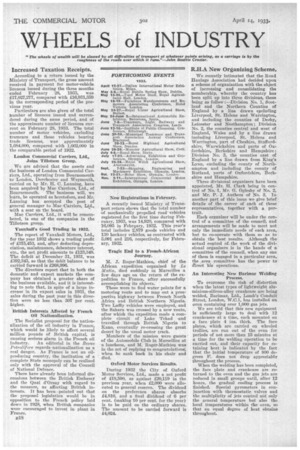WHEELS of INDUSTRY
Page 32

If you've noticed an error in this article please click here to report it so we can fix it.
New Registrations in February.
A recently issued Ministry Of Transport return shows that the total number of mechanically propelled road vehicles registered for the fiist time during February, 1933, was 14,920, compared with 16,095 in Febrtjary, 1932. This year's total includes 2,879 goods vehicles and 130 hackney vehicles, as contrasted with 3,091 and 216, .respectively, for February, 1932.
Tragic End to a French-African Journey.
M. J. Roger-Mathieu, chief of the African expedition organized by Le _Vatin, died suddenly in Marseilles a few days ago on the return of the expedition to Prance, after successfully accomplishing its objects.
These were to find water points for a motoring route and to map out a prospective highway between French North Africa and Britieh Northern Nigeria. Two Lailly vehicles were. employed, and the Sahara was crossed by a new route, after which the expedition made a complete circuit of Lake Tehad and travelled through British Nigeria to Kano, eventually re-crossing the great desert by the usual motor track.
Members of the mission were guests of the Automobile Club in Marseilles at a luncheon, and M. Roger-Mathieu was in the act of replying to congratulation's', when he sank back in his chair and died.
Oxford Motor Services Results.
During 3932 the City . of Oxford Motor Services, Ltd., made a net profit of £18,590, as against £20,119 in the previous year, when £2,000 were allocated to general reserve. The dividend on the preference shares absorbs £4,810, and a final dividend of 6 per cent. (making 10 per cent. for the year) is to be paid on the ordinary shares. The amount to be carried forward is £4,024. R.H.A New Organizing Scheme.
We recently intimated that the Road Haulage Association had decided upon, a scheme of organization with the object of increasing and consolidating the membership, whereby the country has been split up into three divisions, these being as follow :.--Divisaon No. 1, ,Scotland and the Northern Counties of England by a line drawn excluding Liverpool, St. Helens and Warrington, and including the counties of Derby, Leicester and Northampton; Division No. 2, the counties central and west of England, Wales and by a line drawn including Liverpool, St. Helens and Warrington, part of Cheshire, Staffordshire, Warwickshire and parts of Oxfordshire, Berkshire and Hampshire ; Division No. 3, the counties east of England by a line drawn from King's Lynn, excluding the county of Northampton and including the county of Rutland, parts of Oxfordshire, Berkshire and Hampshire.
Three divisional organizers have been appointed, Mr. 14. Clark being in control of No. 1, Mr. O. Oglesby of No. 2, and Mr. P.. T. Anthers of No. 3. In another part of this issue we give briefdetails of the career of each of these representatives, together with a portrait.
Each organizer will be under the eontrol of a committee of the council, and arrangements will be made to meet not only the immediate needs of each area, but to co-operate with them so as to obtain the best results. Although the actual control of the work of the divisional organizers is in the hands of a committee of the council, when any one of them -is engaged in a particular area, the area committee has the power to direct his operations.
An Interesting New Barimar Welding Process.
To overcome the risk of distortion when the latest types of lightweight aluminium-silicon-alloy crankcase are being welded, Barimar, Ltd., Lamb's Conduit Street, London, W.0.1, has installed an oven containing over 1,000 gas jets.
We are told that this new equipment is sufficiently large to deal with 12 crankcases at a time, each mounted on a face plate 4 ins. thick. The face plates, which are carried on wheeled trollies, are run out of the oven for periods of not more than 15 minutes at a time for the welding operation to be carried out, and their capacity for retaining heat is indicated by the fact that the initial temperature of 800 degrees F. does not drop appreciably throughout the process.
When the welding has been completed, the face plate and crankcase are returned to the oven and the gas jets are reduced in small groups until, after 12 hours, the gradual cooling process is finished. Special pyrometers in conjunction with thermostatic valves and the multiplicity of jets control net only the general temperature but also the local temperatures within the oven, so that an equal degree of heat obtains throughout.




























































































